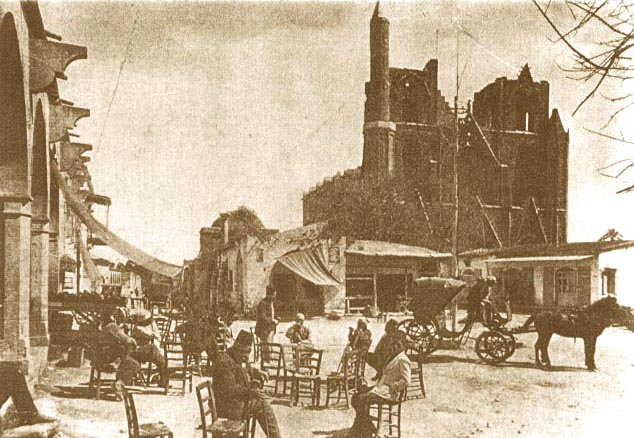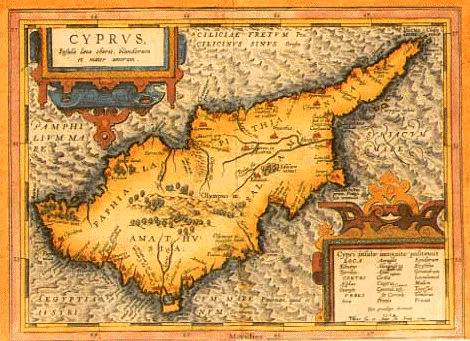 Cyprus has always been an important trading post between the empires of Europe, Africa and the Middle East, and throughout history someone has always wanted to take it off someone else. First the Mycenaeans grabbed it, then the Phoenicians, Egyptians, Assyrians and Persians. Alexander the Great took it off them, then Ptolemy snatched it from him. Rome took over in 58 BC and kept the place in relative peace and security until the 7th century, when the Byzantine and Islamic empires started three centuries of bickering over it. In 1191, Richard the Lionheart, on his way to the Crusades, dropped into Cyprus for a spot of conquering, but the Cypriots caused him too much trouble (one of them killed his hawk and he was forced to massacre a few villages in retaliation), so he sold them to the Knights Templar. The Templars sold the island to Guy de Lusignan, whose heirs hung in for three centuries, repressing the culture and orthodox religion but doing wonders for the economy.
Cyprus has always been an important trading post between the empires of Europe, Africa and the Middle East, and throughout history someone has always wanted to take it off someone else. First the Mycenaeans grabbed it, then the Phoenicians, Egyptians, Assyrians and Persians. Alexander the Great took it off them, then Ptolemy snatched it from him. Rome took over in 58 BC and kept the place in relative peace and security until the 7th century, when the Byzantine and Islamic empires started three centuries of bickering over it. In 1191, Richard the Lionheart, on his way to the Crusades, dropped into Cyprus for a spot of conquering, but the Cypriots caused him too much trouble (one of them killed his hawk and he was forced to massacre a few villages in retaliation), so he sold them to the Knights Templar. The Templars sold the island to Guy de Lusignan, whose heirs hung in for three centuries, repressing the culture and orthodox religion but doing wonders for the economy.The Venetians took over in 1489, but were booted out by the expanding
 Ottoman Empire in 1571, which kept Cyprus for 300 years before handing over to Britain. In 1925 Cyprus became a Crown colony of the UK, but by then the Cypriots had had just about enough of being a pawn for empire-builders, and agitation for self-determination began. This agitation laid the foundations for today's Greek/Turkish conflict: while many Greek Cypriots wanted to form a union with Greece (a movement known as enosis), the Turkish population was not so keen. By 1950, the Cypriot Orthodox Church and 96% of Greek Cypriots wanted enosis. In response, the British drafted a new constitution, which was accepted by the Turkish population but opposed by the National Organisation of Cypriot Fighters, who wanted enosis or nothing. They began a guerrilla war against the British.
Ottoman Empire in 1571, which kept Cyprus for 300 years before handing over to Britain. In 1925 Cyprus became a Crown colony of the UK, but by then the Cypriots had had just about enough of being a pawn for empire-builders, and agitation for self-determination began. This agitation laid the foundations for today's Greek/Turkish conflict: while many Greek Cypriots wanted to form a union with Greece (a movement known as enosis), the Turkish population was not so keen. By 1950, the Cypriot Orthodox Church and 96% of Greek Cypriots wanted enosis. In response, the British drafted a new constitution, which was accepted by the Turkish population but opposed by the National Organisation of Cypriot Fighters, who wanted enosis or nothing. They began a guerrilla war against the British.In August 1960, Britain granted Cyprus its independence. A Greek,
 Archbishop Makarios, became president, while a Turk, Kükük, was made vice-president. By 1964 Makarios was moving towards stronger links with Greece, and intercommunal violence was on the rise. The United Nations sent in a peace-keeping force. In 1967 a military junta took over the Greek government and enosis went out the window - even the most fervent Greece-lovers didn't want union with such a repressive regime. Greece didn't give up, though: on 15 July 1974 a CIA-sponsored, Greek-organised coup overthrew Makarios and replaced him with a puppet leader. Turkey responded by invading and Greece quickly pulled out, but the Turks weren't placated and took the northern third of the island, forcing 180,000 Greek Cypriots to flee their homes. In 1983 Turkish Cypriots proclaimed a separate state, naming it the Turkish Republic of Northern Cyprus (TRNC). No country except for Turkey has recognised this 'state'.
Archbishop Makarios, became president, while a Turk, Kükük, was made vice-president. By 1964 Makarios was moving towards stronger links with Greece, and intercommunal violence was on the rise. The United Nations sent in a peace-keeping force. In 1967 a military junta took over the Greek government and enosis went out the window - even the most fervent Greece-lovers didn't want union with such a repressive regime. Greece didn't give up, though: on 15 July 1974 a CIA-sponsored, Greek-organised coup overthrew Makarios and replaced him with a puppet leader. Turkey responded by invading and Greece quickly pulled out, but the Turks weren't placated and took the northern third of the island, forcing 180,000 Greek Cypriots to flee their homes. In 1983 Turkish Cypriots proclaimed a separate state, naming it the Turkish Republic of Northern Cyprus (TRNC). No country except for Turkey has recognised this 'state'.